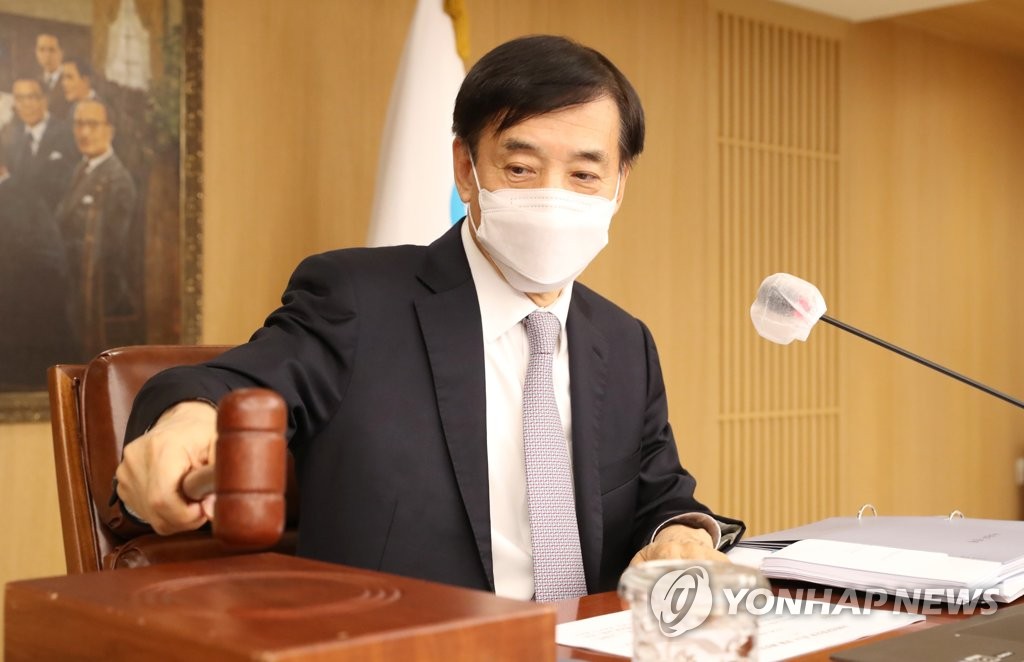Freeze from last July

(Seoul = Yonhap News) Bank of Korea governor Joo-yeol Lee is tapping the gavel at the Financial Monetary Commission plenary meeting held at the Bank of Korea in Jung-gu, Seoul on the morning of the 15th.
[한국은행 제공. 재판매 및 DB 금지] [email protected]
(Seoul = Yonhap News) Reporter Shin Seong Seo-ho = The Bank of Korea Financial and Monetary Commission (hereinafter referred to as the Financial Services Commission) decided on the 15th to maintain the standard interest rate of 0.5% per year.
Earlier, the Financial Services Commission announced that the economic downturn was expected due to a new coronavirus infection (Corona 19) at the beginning of last year, and on March 16 of the same year,’Big Cut’ (1.25% → 0.75%) and an additional cut on May 28 (0.75% → 0.5%). Through this, the interest rate fell by 0.75 percentage points in two months.
However, it is interpreted that the need to further cut interest rates is not large given the relatively stable financial market and the overheating controversy in the asset market such as real estate and stocks.
However, since the third corona19 pandemic and social distancing since November of last year, interest rates cannot be raised again in a situation where fears of the economic downturn are growing. As such, it is impossible to raise interest rates again in July, August, and October of last year. It seems that there was no other choice except for the fifth’freeze’ following November.
Due to the freeze of the benchmark interest rate, the gap with the US Federal Reserve (Fed/Fed) standard interest rate (cut to 0.00 to 0.25% in March) remained at 0.25 to 0.5 percentage point (p).

[정연주 제작] Photo synthesis/illustration
Ahead of the Commission on that day, academics, research institutes, and bond market experts also predicted’unanimously freeze the standard interest rate for the Bankruptcy Commissioner’. Experts predicted that the Financial Services Commission will adhere to the stance of’mitigating monetary policy’ in terms of economic defense, taking into account the third corona spread.
In the results of a survey of 200 employees in the bond industry by the Financial Investment Association on the 4th to 7th, all 100 respondents expected the base rate to be frozen. As the economic uncertainty related to Corona 19 is still large, major countries are maintaining interest rate freeze, and analysis that it is difficult for us to change the current interest rate level was dominant.
Amid low interest rates, last year’s household loans rose to a record-high (100 trillion won), and this liquidity was concentrated in assets such as real estate and stocks, and controversy over “bubbles” increased, which is believed to have affected the decision to freeze interest rates.
BOK Governor Lee Ju-yeol also warned on the 5th in the’New Year’s Address in the Pan-Financial Area’ that “there are a lot of issues to resolve such as the debt problem left behind as the aftereffect of the corona crisis and the shift of funds to the asset market.” He stressed, “Especially in a state where the debt level is high and the financial-real gap widens, the market can be greatly shaken even by a small shock, so we need to take a closer look at the weak areas of the financial system.”
In addition, the criticism that the current base rate (0.5%) has reached the’lowest effective limit’ (the lowest interest rate level that can be realistically lowered) is one of the reasons why further rate cuts are not easy.
From the standpoint of the won, which is not a key currency such as the dollar (basic currency for international settlements and financial transactions), if the interest rate is 0.25% lower by 0.25% and equals the top of the US standard rate (0.25%), the outflow of funds from foreign investors, etc. Because I am concerned.

(Seoul = Yonhap News) Bank of Korea Governor Lee Ju-yeol presides over a plenary meeting of the Financial Monetary Commission at the Bank of Korea in Jung-gu, Seoul on the morning of the 15th.
[한국은행 제공. 재판매 및 DB 금지] [email protected]
The financial and foreign exchange markets are also relatively stable to lower interest rates further.
In the case of the Treasury Bond (3-year) interest rate, it is 0.98% as of the 13th of this month. The trend is rising due to foreigners’ net selling of government bond futures, wary of government bond supply and demand, and agreement on US economic stimulus measures, but it is still lower than at the end of 2019 (1.36%).
The won/dollar exchange rate, which soared to the 1,280 won range in March last year, at the beginning of the Corona 19 crisis, has recently remained around 1,100 won.
[email protected], [email protected]
Unauthorized reproduction-redistribution prohibited>
2021/01/15 09:45 sent
